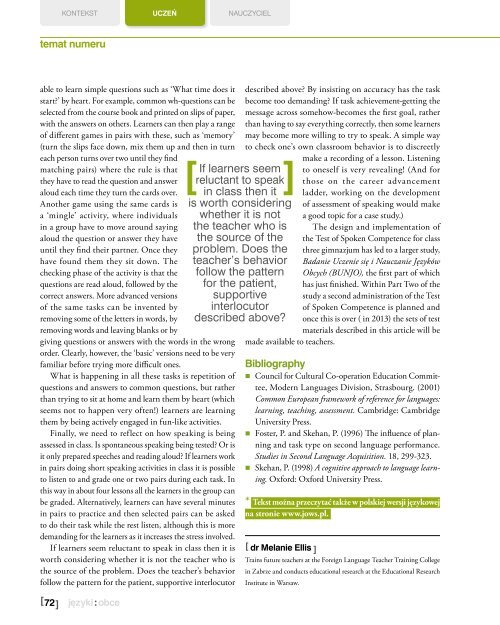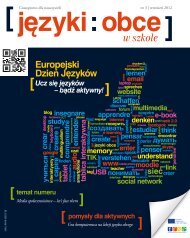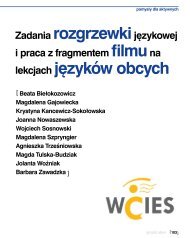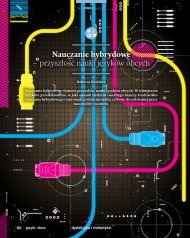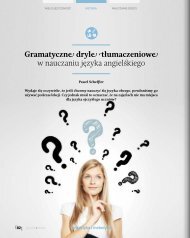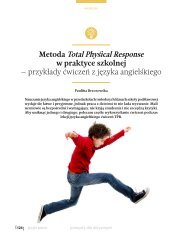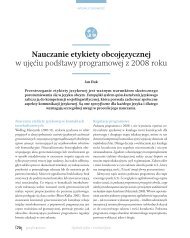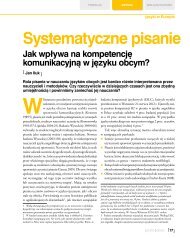0446-7965
temat numeru - JÄzyki Obce w Szkole
temat numeru - JÄzyki Obce w Szkole
- No tags were found...
You also want an ePaper? Increase the reach of your titles
YUMPU automatically turns print PDFs into web optimized ePapers that Google loves.
kontekst<br />
uczeń<br />
nauczyciel<br />
temat numeru<br />
able to learn simple questions such as ‘What time does it<br />
start?’ by heart. For example, common wh-questions can be<br />
selected from the course book and printed on slips of paper,<br />
with the answers on others. Learners can then play a range<br />
of different games in pairs with these, such as ‘memory’<br />
(turn the slips face down, mix them up and then in turn<br />
each person turns over two until they find<br />
matching pairs) where the rule is that<br />
they have to read the question and answer<br />
aloud each time they turn the cards over.<br />
Another game using the same cards is<br />
a ‘mingle’ activity, where individuals<br />
in a group have to move around saying<br />
aloud the question or answer they have<br />
until they find their partner. Once they<br />
have found them they sit down. The<br />
checking phase of the activity is that the<br />
questions are read aloud, followed by the<br />
correct answers. More advanced versions<br />
of the same tasks can be invented by<br />
removing some of the letters in words, by<br />
removing words and leaving blanks or by<br />
giving questions or answers with the words in the wrong<br />
order. Clearly, however, the ‘basic’ versions need to be very<br />
familiar before trying more difficult ones.<br />
What is happening in all these tasks is repetition of<br />
questions and answers to common questions, but rather<br />
than trying to sit at home and learn them by heart (which<br />
seems not to happen very often!) learners are learning<br />
them by being actively engaged in fun-like activities.<br />
Finally, we need to reflect on how speaking is being<br />
assessed in class. Is spontaneous speaking being tested? Or is<br />
it only prepared speeches and reading aloud? If learners work<br />
in pairs doing short speaking activities in class it is possible<br />
to listen to and grade one or two pairs during each task. In<br />
this way in about four lessons all the learners in the group can<br />
be graded. Alternatively, learners can have several minutes<br />
in pairs to practice and then selected pairs can be asked<br />
to do their task while the rest listen, although this is more<br />
demanding for the learners as it increases the stress involved.<br />
If learners seem reluctant to speak in class then it is<br />
worth considering whether it is not the teacher who is<br />
the source of the problem. Does the teacher’s behavior<br />
follow the pattern for the patient, supportive interlocutor<br />
[ 72 ]<br />
If learners seem<br />
reluctant to speak<br />
in class then it<br />
is worth considering<br />
whether it is not<br />
the teacher who is<br />
the source of the<br />
problem. Does the<br />
teacher’s behavior<br />
follow the pattern<br />
for the patient,<br />
supportive<br />
interlocutor<br />
described above?<br />
described above? By insisting on accuracy has the task<br />
become too demanding? If task achievement-getting the<br />
message across somehow-becomes the first goal, rather<br />
than having to say everything correctly, then some learners<br />
may become more willing to try to speak. A simple way<br />
to check one’s own classroom behavior is to discreetly<br />
make a recording of a lesson. Listening<br />
to oneself is very revealing! (And for<br />
those on the career advancement<br />
ladder, working on the development<br />
of assessment of speaking would make<br />
a good topic for a case study.)<br />
The design and implementation of<br />
the Test of Spoken Competence for class<br />
three gimnazjum has led to a larger study,<br />
Badanie Uczenie się i Nauczanie Języków<br />
Obcych (BUNJO), the first part of which<br />
has just finished. Within Part Two of the<br />
study a second administration of the Test<br />
of Spoken Competence is planned and<br />
once this is over ( in 2013) the sets of test<br />
materials described in this article will be<br />
made available to teachers.<br />
Bibliography<br />
• Council for Cultural Co-operation Education Committee,<br />
Modern Languages Division, Strasbourg. (2001)<br />
Common European framework of reference for languages:<br />
learning, teaching, assessment. Cambridge: Cambridge<br />
University Press.<br />
• Foster, P. and Skehan, P. (1996) The influence of planning<br />
and task type on second language performance.<br />
Studies in Second Language Acquisition. 18, 299-323.<br />
• Skehan, P. (1998) A cognitive approach to language learning.<br />
Oxford: Oxford University Press.<br />
* Tekst można przeczytać także w polskiej wersji językowej<br />
na stronie www.jows.pl..<br />
[ dr Melanie Ellis ]<br />
Trains future teachers at the Foreign Language Teacher Training College<br />
in Zabrze and conducts educational research at the Educational Research<br />
Institute in Warsaw.


